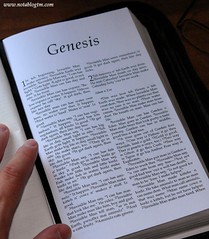Deuteronomy 32:9 - For Jehovah's portion is his people; Jacob is the lot of his inheritance. -- American Standard Version.
Deuteronomy 32:8 - When the Most High gave to the nations their inheritance, when he divided mankind, he fixed the borders of the peoples according to the number of the sons of God.
Deuteronomy 32:9 - But [Jehovah*]'s portion is his people, Jacob his allotted heritage. -- English Standard Version, *edited to present God's Holy Name as "Jehovah".
We should note that the manuscripts do show a slight disagreement in reading in verse 8. The Masoretic text reads "sons of Israel" while a reading from one of the Dead Sea Scrolls reads "sons of God". Some apparently claim that "the expression sons of God" refers to the angels or to all the descendants of Adam. Actually, the children of Israel are referred to as sons of Jehovah in Deuteronomy 14:1, thus, it is more than likely that "sons of God" in verse 8 and "his people" of verse 9 are both one and the same. We believe that to be the most logical reasoning related to this, and thus the default understanding.
Nevertheless, some appear to read into this that the "Most High" [Elyon] is used in reference to the "sons of Adam" while "Jehovah" is used only in reference to the children of Israel. From this, it appears that they further claim that "Most High" refers to their alleged "God the Father" -- the assumed "first person" of their imagined triune God -- while "Jehovah" is claimed to be the second person of their imagined and assumed triune God. Of course, the idea of a triune God is not actually there or anywhere else in the entire Bible. The idea has to be assumed beyond what is stated and other assumptions have to be created, and these have to be added to and read into what is stated in order to "see" their triune God in Deuteronomy 32:8,9.
Some wish to make it appear that "Jehovah" in Deuteronomy 32:9 is Jesus and claim that Jesus is the God of Israel, while another person of the triune God is the God of the other nations. This, in effect, would mean that God who spoke through the prophets of the Old Testament is Jesus, which should make one wonder who is the son of Jesus as spoken of in Hebrews 1:1,2. The reality is that Jehovah in the Old Testament is the God and Father of Jesus. It was the God and Father of Jesus (Micah 5:4; Ephesians 1:3; 1 Peter 1:3) who spoke through Moses and foretold that the Messiah was to be a prophet like Moses. (Deuteronomy 18:15-19; Acts 3:13-26) Thus, Jesus is the "Son" through whom Jehovah now speaks. -- Deuteronomy 18:15-19; John 14:10,24; 17:1,8,24; Hebrews 1:1,2.
The scriptural conclusion is that Elyon and Jehovah are the same person. We find many scriptures in the Old Testament where ELYON is used as a title of Jehovah, the God of the Messiah (Isaiah 61:1,2; Micah 5:4). -- Numbers 2416; 1 Samuel 2.10; 2 Samuel 22.14; 23.1; Psalms 7.8, 10, 17; 9.2; 21.7; 46.4; 47.2; 50.14; 57.2; 73.11; 77.10; 78.17, 35, 56; 83.18; 87.5; 91.1,9; 92.1; 97.9; 107.11; Lamentations 3.35, 38; Daniel 3.26; 4.2, 17, 25, 32, 34; 5.18, 21; 7.18, 22, 25; Hosea 7.16.
There is no scriptural reason at all to think that ELYON in Deuteronomy 32:8 is not JEHOVAH of Deuteronomy 32:9. There is definitely nothing in either verse or anywhere else in the Bible that says that God is more than one person.







